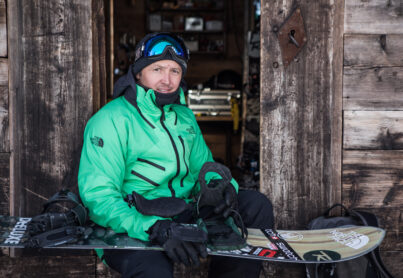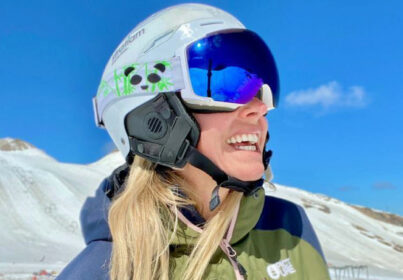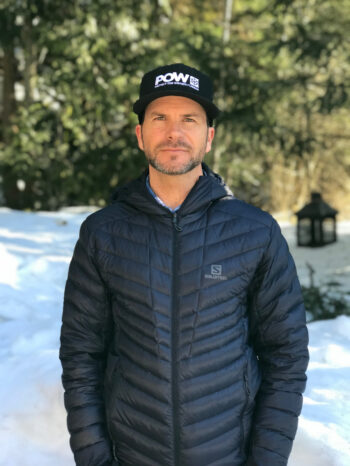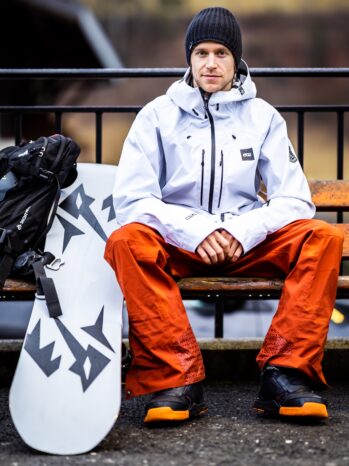This website uses cookies to ensure you get the best experience on our website. To read our full cookie policy please click here.
How to take a more sustainable ski holiday
Is there such thing as a sustainable ski holiday?
By Abigail Butcher
Well, if you make some careful decisions it’s certainly possible to enjoy your time away in the mountains with a clearer conscience — sadly no one can ignore the evidence of climate change when they’re skiing any more.
Professional skiers and snowboarders have been up close and personal with the effects of climate change in the mountains, and all are altering their behaviour after decades of flying round the world and taking helicopters up mountains.
What better place to start then, than asking a few ski and snowboard pros for their top tips on how to take a more sustainable ski holiday.
Pic courtesy of Warren Smith Ski Academy
Reuse water bottles and coffee cups, and take the train: Xavier De Le Rue

Pic courtesy of Tero Repo
French snowboarding legend Xavier De Le Rue is based in Verbier, Switzerland, where he has started a petition to ban single-use plastic water bottles on the mountain. He has produced a short film “How to be an Eco Rider” on ways we can reduce our carbon-footprint in the mountains, saying: “Enjoying the mountains comes with a duty, and that is respecting the nature. If we all do little steps, it’s going to make a huge difference”.
Among Xavier’s top tips are take a reusable water bottle and take a “keep cup” — or better still, sit down for five or ten minutes to have a coffee in a china cup rather than grabbing a take-out cup (which are difficult to recycle and use 200L of water in manufacture). Give preference to sustainable resorts and choose a brand that thinks about the environment.
“These things are pretty easy and something that I think a lot of freeriders do anyway,” says Xavier. “A PET water bottle will take over 500 years to biodegrade on the mountain… so basically it isn’t going anywhere.”
He continues: “Over 70% of a ski resort’s carbon footprint is accounted for by visitor transport to resort, predominantly by air or road. If you are able to take the train you can cut your carbon emissions by up to 90%. There are lots of car-pooling sites, like Mountain Rideshare or Ski Carpool in Colorado, that help you get to the mountains, or give others a ride. When in resort, try to use the public transport, lots of resorts have free shuttles… or walk and get those legs strong for the big powder days!”
Think carefully about kit — rent if you can: Chemmy Alcott
 Changing the way we as consumers “use and reuse” clothing could contribute to 347 million metric tons of emission abatement in 2030 according to McKinsey research. So that means reducing the number of times you wash and dry your kit, renting clothes instead of buying, repairing and refurbishing them and recycling rather than binning an item when you have finished with it.
Changing the way we as consumers “use and reuse” clothing could contribute to 347 million metric tons of emission abatement in 2030 according to McKinsey research. So that means reducing the number of times you wash and dry your kit, renting clothes instead of buying, repairing and refurbishing them and recycling rather than binning an item when you have finished with it.
British Olympic skier Chemmy Alcott highlights the pioneering work of EcoSki, which allows consumers to do just that.
“I’d really recommend looking up EcoSki’s rental platform — they are the first UK retailer to offer a skiwear rental service this coming season,” says the EcoSki ambassador. “Renting your kit is a great way of reducing your ski clothing footprint and limiting unnecessary waste.”
Change your travel habits and rethink carbon offsets: POW Canada chairman Mike Douglas
 “The benefits people get from being in the mountains and seeing nature far outweigh the carbon to get there — but the elephant in the room is the travel. Go less often but stay longer – go twice a year and stay two weeks rather than lots of different weeks,” says Mike.
“The benefits people get from being in the mountains and seeing nature far outweigh the carbon to get there — but the elephant in the room is the travel. Go less often but stay longer – go twice a year and stay two weeks rather than lots of different weeks,” says Mike.
“There’s a lot of talk about carbon offsets but don’t just put your money in blindly, beware of greenwashing. I’m not a big offsets fan and suggest instead that you set aside a certain amount of time – if you’re going to fly for four hours for your holiday, offset it with four hours of productive time. Join a group like POW, write a letter to your MP, your town council, get involved in a campaign — last year with POW we stopped two mines in North America by doing a letter-writing campaigning with two other organisations. The public outcry was too great, the government couldn’t allow the project. We offset two lifetimes of each person who wrote a letter!”
Cut out the heli-skiing and take longer trips: Warren Smith, ambassador for POW UK

Pic courtesy of Warren Smith Ski Academy
“Our clients [at the Warren Smith Ski Academy] are definitely heading towards flying less and staying longer — we have set up 50% more longer duration products like ‘Masters’ and ‘Supergroup’ with a four- or six-week course duration. We have also removed all heli-ski offerings and swapped them for ski touring — it’s what clients are wanting and last winter, with coronavirus, ski touring really came into its own.”
Don’t give up dreams, but every little helps: professional snowboarder Mathieu Schaer

Pic courtesy of Kate MacLeod
Mathieu rides for Jones snowboards, and works with Protect Our Winters (POW), the climate change organisation founded by Jeremy Jones. He is a peer-reviewed scientist with a Masters in Environmental Sciences and Engineering and now only works with sponsors that don’t ask him to fly. In his 2019 film, Shelter, made in Switzerland, he explores the balance between sustainable travel and ski-touring/split-boarding in the mountains.
“I don’t want to give lessons: if your dream is to go once to Japan, then do it. The problem is that for the environment the poison is in the quantity; it’s not doing something or doing it, it’s how much we do it. You don’t have to go to Whistler every year, maybe just realise that we can fulfil our desires much closer to home.
He added: “Shelter is not just to raise awareness but to try and bring people to question things related to global warming and, as mountain lovers, to think about how we can make our approach to our sport more eco-friendly. Climate change is such a global problem that we need to touch everyone, and it’s easiest to touch people when it’s through something that they love.”

